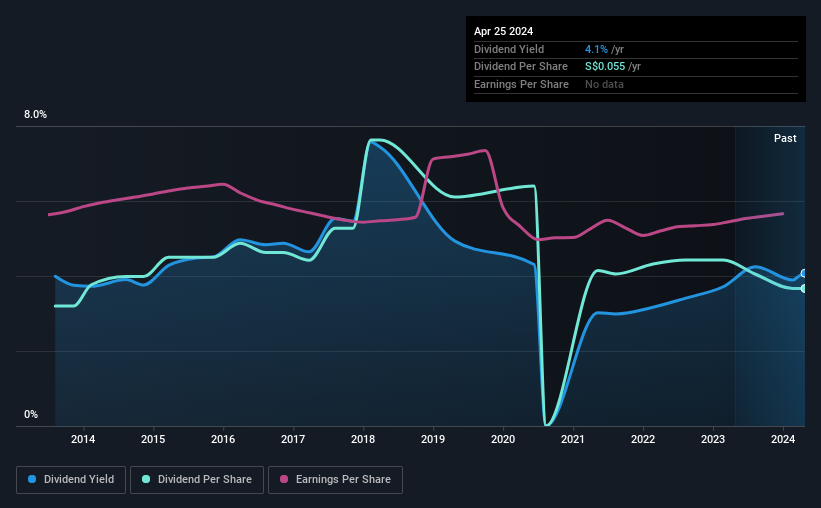VICOM (SGX:WJP) Is Due To Pay A Dividend Of SGD0.0275
The board of VICOM Ltd (SGX:WJP) has announced that it will pay a dividend on the 13th of May, with investors receiving SGD0.0275 per share. Despite the cut, the dividend yield of 4.1% will still be comparable to other companies in the industry.
View our latest analysis for VICOM
VICOM's Earnings Easily Cover The Distributions
While it is always good to see a solid dividend yield, we should also consider whether the payment is feasible. The last dividend made up a very large portion of earnings and also represented 94% of free cash flows. This is usually an indication that the focus of the company is returning cash to shareholders rather than reinvesting it for growth.
EPS is set to fall by 4.5% over the next 12 months if recent trends continue. However, if the dividend continues along recent trends, we estimate the payout ratio could reach 79%, meaning that most of the company's earnings is being paid out to shareholders.
Dividend Volatility
While the company has been paying a dividend for a long time, it has cut the dividend at least once in the last 10 years. The dividend has gone from an annual total of SGD0.048 in 2014 to the most recent total annual payment of SGD0.055. This means that it has been growing its distributions at 1.4% per annum over that time. It's encouraging to see some dividend growth, but the dividend has been cut at least once, and the size of the cut would eliminate most of the growth anyway, which makes this less attractive as an income investment.
VICOM May Find It Hard To Grow The Dividend
With a relatively unstable dividend, it's even more important to see if earnings per share is growing. Over the past five years, it looks as though VICOM's EPS has declined at around 4.5% a year. Declining earnings will inevitably lead to the company paying a lower dividend in line with lower profits.
In Summary
Overall, it's not great to see that the dividend has been cut, but this might be explained by the payments being a bit high previously. The low payout ratio is a redeeming feature, but generally we are not too happy with the payments VICOM has been making. Overall, we don't think this company has the makings of a good income stock.
It's important to note that companies having a consistent dividend policy will generate greater investor confidence than those having an erratic one. Meanwhile, despite the importance of dividend payments, they are not the only factors our readers should know when assessing a company. Case in point: We've spotted 2 warning signs for VICOM (of which 1 is significant!) you should know about. Is VICOM not quite the opportunity you were looking for? Why not check out our selection of top dividend stocks.
Have feedback on this article? Concerned about the content? Get in touch with us directly. Alternatively, email editorial-team (at) simplywallst.com.
This article by Simply Wall St is general in nature. We provide commentary based on historical data and analyst forecasts only using an unbiased methodology and our articles are not intended to be financial advice. It does not constitute a recommendation to buy or sell any stock, and does not take account of your objectives, or your financial situation. We aim to bring you long-term focused analysis driven by fundamental data. Note that our analysis may not factor in the latest price-sensitive company announcements or qualitative material. Simply Wall St has no position in any stocks mentioned.

 Yahoo Finance
Yahoo Finance 
